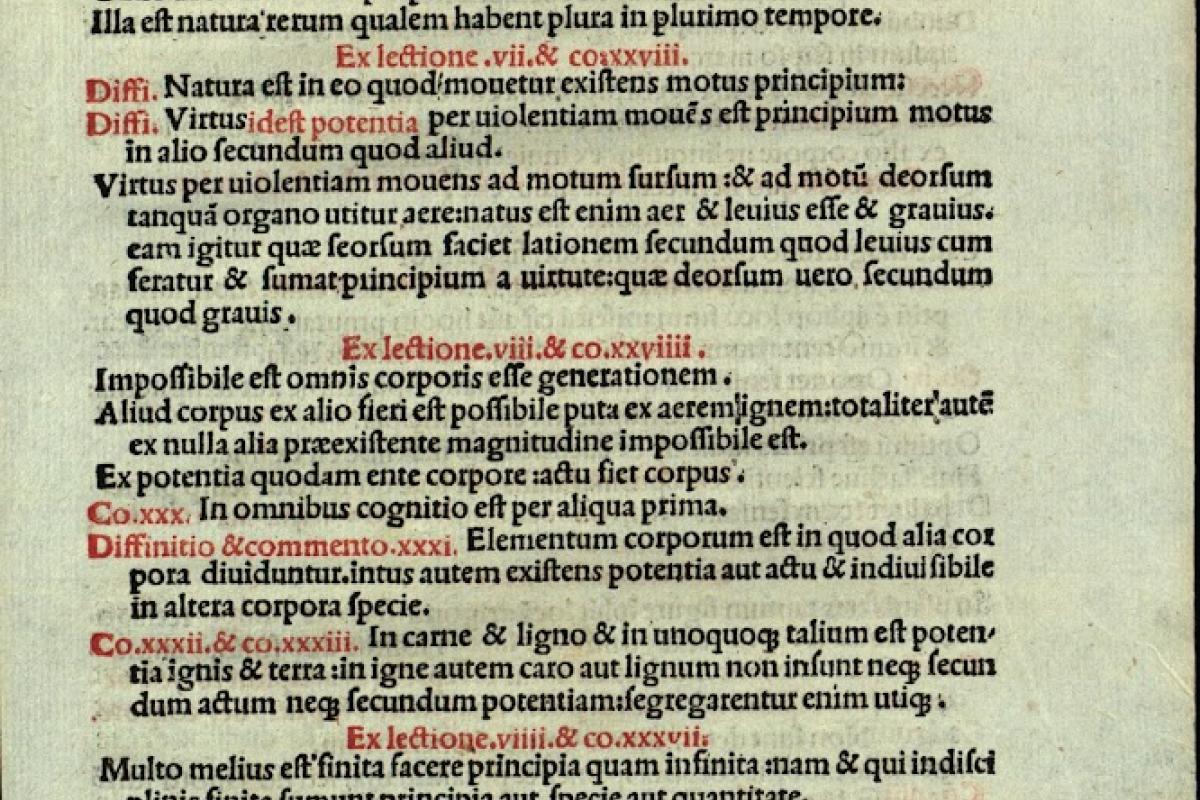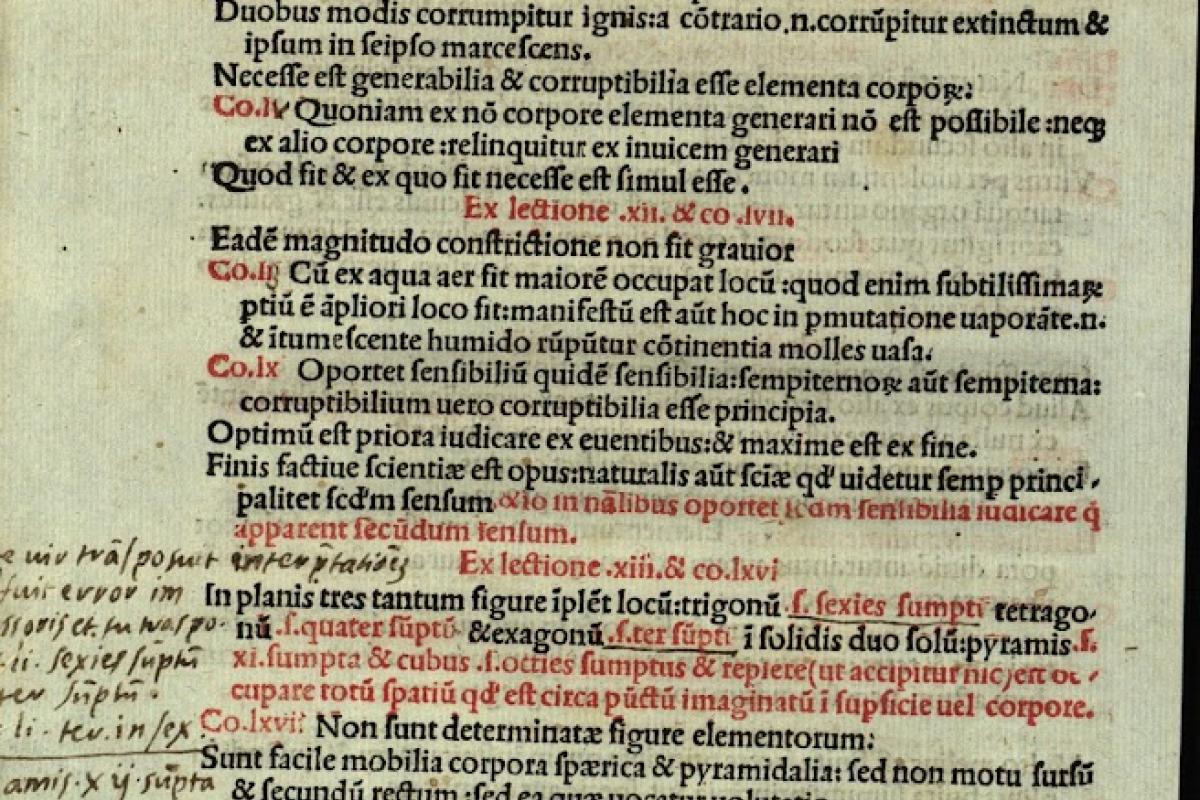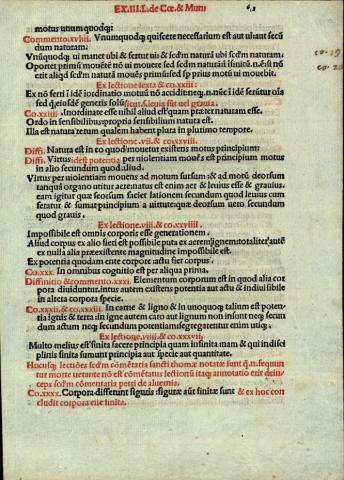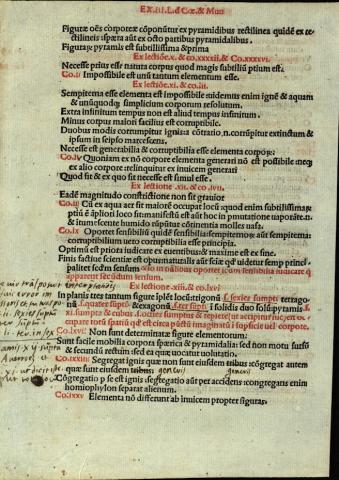Leaf from Propositiones ex omnibus Aristotelis libris excerptae
Leaf from Propositiones ex omnibus Aristotelis libris excerptae
Renaissance, ca. 1493
Author: Theophilus de Ferrariis
Printer: Joannes and Gregorius de Gregoriis
Incunabulum Leaf, one page, two-sided, bearing black Roman text separated by red-inked headings with handwritten marginal notes. A note on the last page of this book explains that it was published at the expense of Alexander Calcedonus of Pisaurum (a merchant) under special license of the Doge; others found printing this book were subject to confiscation of the entire edition. “Probably one of the first instances of publisher’s copyright.”
Portland State University Library Special Collections, Shipley 4
Jared Short, Medieval Portland Capstone Student. 2016
The content of this leaf is comprised of the cornerstone of Aristotelian logic and is an integral piece of philosophical discourse from Aristotle’s own time through the 19th century.[1] In Aristotelian logic, Propositions are a basic unit of language consisting of a subject, a verb, and a predicate used to make an assertion about the subject. For example, the phrase “the Earth is spherical” constitutes an Aristotelian proposition. Using these propositions as a tool for logical discourse Aristotle developed his brand of philosophical thinking into an over-arching study of critical thought spanning multiple fields of inquiry and many centuries.[2]
The complete work from which this leaf originates, Propositiones ex omnibus Aristotelis libris excerptae (roughly, Propositions of All Aristotle’s Books), contains excerpts of Aristotle’s works compiled and penned by Brother Theophilus de Ferrariis of Cremona,[3] “an obscure priest…that posterity has spurned.”[4] Throughout the text, Aristotle’s Propositions are organized beneath red-inked headings located at the top of each page, indicating the original work from which they were drawn. Specifically, this leaf was taken from a portion of the complete text preceded by a heading that is not included on the leaf. That full heading “Propositiones ex octauo libro physicorum Aristotelis,”[5] which translates as “Propositions from Aristotle’s eighth book of physics” is shortened on this leaf as “EX.VII.LI.PHYSI.”
Despite its humble authorship and understated aesthetic—eschewing intricate typeface and ornate decoration in favor of a more reserved, black and red Roman text, the complete Propositiones carries several indications that it was a work of notable significance.
History
The complete Propositiones was financed by Alexander Calcedonius of Venice. He was referred to as a merchant on the final page of the complete text.[6] Beyond the 1493 printing of Propositiones, Alexander Calcedonius is also known to have commissioned at least five other printings between 1492 and 1499, most of which involved the works of either Aristotle, Saint Thomas Aquinas, or both.[7] Second, In addition to Calcedonius’s prolific patronage, half of the pieces (including Propositiones ex omnibus Aristotelis libris excerptae) attributed to his proprietorship were printed by famed printmaking brothers Johannes and Gregorius de Gregoriis of Forlivio.[8]
Notes
[1] Groarke, Louis F. “Aristotle: Logic,” Internet Encyclopedia of Philosophy, http://www.iep.utm.edu/aris-log/
[2] Ibid.
[3] “Incunabula Short Title Catalogue,” The British Library Board, Accessed November 20, 2016, http://istc.bl.uk/search/search.html?operation=record&rsid=605761&q=5
[4] Westphal, Bertrand. The Plausible World: A Geocritical Approach to Space, Place, and Maps. Springer, 2013.
[5] “Digitale Bibliothek - Münchener Digitalisierungszentrum,” German Research Foundation, Accessed November 20, 2016, http://daten.digitale-sammlungen.de/bsb00052937/image_208
[6] “Digitale Bibliothek - Münchener Digitalisierungszentrum,” German Research Foundation, Accessed November 20, 2016. http://daten.digitale-sammlungen.de/bsb00052937/image_690
[7] “Details of printer or publisher,” Bodleian Libraries, Accessed November 20, 2016, http://incunables.bodleian.ox.ac.uk/printers/record/15
[8] Ibid.
Works Cited
Brown, Horatio Forbes. Venice: An historical sketch of the republic. Rivington, Percival, 1893.
“Details of printer or publisher,” Bodleian Libraries, Accessed November 20, 2016, \ http://incunables.bodleian.ox.ac.uk/printers/record/15
“Digitale Bibliothek - Münchener Digitalisierungszentrum,”
German Research Foundation, Accessed November 20, 2016, http://daten.digitalesammlungen.de/bsb00052937/image_208
“Digitale Bibliothek - Münchener Digitalisierungszentrum,”
German Research Foundation, Accessed November 20, 2016. http://daten.digitalesammlungen.de/bsb00052937/image_690
Groarke, Louis F. “Aristotle: Logic,” Internet Encyclopedia of Philosophy
http://www.iep.utm.edu/aris-log/
“Incunabula Short Title Catalogue,” The British Library Board
Accessed November 20, 2016, http://istc.bl.uk/search/search.html?operation=record&rsid=605761&q=5
“Incunabula Short Title Catalogue,” The British Library Board
Accessed November 20, 2016, http://istc.bl.uk/search/search.html?operation=search&fieldidx1=dc.publisher&fieldrel1=exact&fieldcont1=johannes%20and%20gregorius%20de%20gregoriis,%20de%20forlivio
Westphal, Bertrand. The Plausible World: A Geocritical Approach to Space, Place, and Maps. Springer, 2013.




